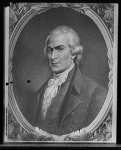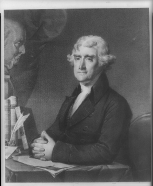Lesson Plan: Early Political Parties
Date:
Objectives: The students will
I. identify the beliefs of the Federalists and the Democratic-Republicans
of the Election of 1800.
II. simulate the role of the electoral college and House of Representatives
in the election of the President.
III. evaluate the validity of the Electoral College in the 1800 and
the 2000 elections.
Warm Up Activity (Anticipatory Set): Chart on Early Political Parties
A) Have students copy chart into their notes or distribute a printed
version of the chart.
B) Have students turn to page 280 in their text book.
C) Make an overhead transparency of the chart and cut the chart
into sections.
D) Distribute the sections to individual students. Have them place
the sections in their correct place on the chart.
| The
Federalists

Alexander Hamilton
|
Democratic-Republicans

Thomas Jefferson
|
| Social
Make- Up |
Merchants,
Bankers, manufacturers,
New England and Mid-Atlantic Coast |
Artists, shopkeepers,
settlers, and southern plantation owners, small farm owners in the south
and from western regions of the nation. |
| Attitude
Toward Government |
-
Wanted to imitate British aristocracy
(rule by the rich) but without a king.
-
Saw the common people as unable
govern themselves.
-
Willing to censor the press for political power.
|
-
Wanted more democracy than in the
British Parliament.
-
Common people were able to govern themselves. They
wanted
greater involvement by the people
through lower voting qualification.
-
Reduce government interference
by decreasing numbers of federal
officeholders.
-
Favored freedom of speech & press.
|
| View
on the Constitution |
| Held "loose constructionist"
view that the Federal government had implied powers not listed in the Constitution. |
Held ''strict''
view of the constitution:
limit the powers of the central
government and support states rights. |
| Foreign
Policy Positions |
| Favored Britain
in culture and trade. |
Distrusted Britain
& wanted closer
relations with France, which had
just been through a democratic
revolution. |
Main Activity (Instructional Input): The Election of 1800
A) Divide the class into two groups: Federalists and Republicans
B) Choose two students to play the roles of Thomas Jefferson and
John Adams.
C) Choose another student to play the role of Aaron Burr.
D) Follow the following procedure:
1) The teacher acts as the Speaker of the House of Representatives.
2) Have the "delegates" meet and read aloud their roles.
3) Have each candidate read their speeches aloud to the class.
4) Have the delegates submit a vote on paper according to the roles
they have received)
5) The Speaker counts the votes aloud. The Speaker will break the
tie in favor of Jefferson.
Distribute the following scenarios to the two groups and to the
candidates.
|
The Federalists
You believe in a powerful national government, one that will unite the
often divided 15 states. You believe that the government should make laws
that protect American businesses, especially new factories that are popping
up in the northeastern states of Massachusetts and Connecticut and to protect
the growing ports of Boston and New York. Your party is made up of merchants
and businessmen, and the Federalists are calling for laws that will help
those businesspeople become wealthy. Your party also favors Great Britain
over France. Your party dislikes the king, but you believe the rich are
the best rulers as opposed to the common folk, who you see as too ignorant
to rule the nation. You believe Thomas Jefferson as a godless non-Christian
who would get rid of religion in America.
You are members of the Electoral College. In the election of 1800, you
and your fellow party members will vote for John Adams, who passed laws
against the Democratic Republicans such as the Alien and sedition Acts.
The Democratic Republicans
You and your party members support Thomas Jefferson, who believes in
the power of the American farmer. Your party is made up of farmers from
the South and from the newly admitted western states of Kentucky and Tennessee.
You fear a strong central government and you helped bring about the Bill
of Rights just nine years earlier. You dislike Federalist policies such
as tariffs on factory-made goods from England, and you see the Federalists
as willing to violate the Constitution in order to stay in power. The Alien
and Sedition Acts are seen as examples of this by members of your party.
In the election of 1800, you will act as members of the Electoral College,
and you will vote for both Thomas Jefferson and Aaron Burr. The way the
electoral college works at this time, the first place candidate wins the
presidency, and the second place winner becomes vice-president.
Thomas Jefferson: Speech
My experience as vice president under Mr. John Adams, as governor of
the state of Virginia, and as Ambassador to France and Secretary of State
under our first President Mr. George Washington should lead you to submit
your electoral vote for me. I will lead our nation to greater power here
in North America and abroad. I will prevent British power from spreading
in North America, and I will seek territory from Spain who holds land to
our west.
Aaron Burr: Speech
My friend Mr. Jefferson is respected and loved by many of our people.
But he has had his chance to govern. It is time for new blood, new leadership
to bring the common man into the halls of power here in our new capital.
I pledge to wage war against Mexico in order to expand westward, where
great riches lay. Under my leadership, these United States will become
a great power in North America, and through our willingness to fight our
enemies where ever they may be, we will become a great power in the world.
John Adams: Speech
I have led this great nation since the people elected me as their president
in 1796. Before that, I served under Mr. Washington as vice president,
and before that, as delegate from Massachusetts to the Continental and
Constitutional Congresses. I am my fellow delegates created a plan of government
that puts in place a strong federal government, one that will enforce the
laws of the land. While we want to protect the rights of the people through
a bill of rights, which we enacted just nine years ago, we also pledge
to see that businesses flourish and that our nation's wealth increases.
That way, we can make the words of our Constitution that say "secure the
blessings of liberty" become a reality. Keep me in the office of the president,
and I pledge my honor to do my best as President.
|
|
Guided Practice:
A) Display the following map to students:

Image Courtesy of Dept. of the Interior.
B) Have students answer these questions:
1) Which regions voted Federalist?
2) Which states voted Democratic Republican?
3) What does the yellow area stand for?
4) Which states had the greatest number of electoral votes?
5) How similar is the distribution of Electoral votes in the east today
as compared to 1800?
Homework (Independent Practice): Comparing 1800 to 2000
A) Have students locate an electoral college map of the 2000 election.
B) Have students identify similarities between the two election. Have
them also discuss differences.
C) Have students create a cartoon or poster for the Election of 1800
that supports one side or the other. Instruct students to use symbols for
Federalist and Democratic-Republican Parties similar to donkey and elephant
seen for the modern parties.
D) Have students explain their cartoon or poster to the class.
Wrap-Up Activity (Closure): The Electoral College: Should It be Abandoned?
A) Have students discuss the purpose of the Electoral College. Inform
students that the Electoral College allows smaller states and rural areas
to have equal power to large states and populated areas.
B) Have students write a short essay describing why the Electoral
College was created and stating whether or not they believe it should be
changed or abolished.
Evaluation: The lesson will be evaluated by:
I. the accuracy of student's written responses;
II. student's scores on future tests and quizzes.
George Cassutto's Cyberlearning
World
[Lesson Plan of the
Day]
[Cassutto
Memorial] [About
the Author] [Search]
[Civics
Lesson Plans]



